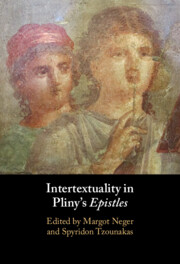Book contents
- Intertextuality in Pliny’s Epistles
- Intertextuality in Pliny’s Epistles
- Copyright page
- Contents
- Contributors
- Acknowledgements
- Abbreviations
- Introduction
- Part I Intertextuality and Interdiscursivity in Pliny’s Letters
- Part II Models and Anti-Models: Pliny’s Interaction with Oratory and Natural History
- Part III Pliny and Seneca: Discourses of Grief and Posthumous Reputation
- Part IV Pliny’s Villas and Their Poetic Models
- Part V Pliny Turns Nasty: Satire and the Scoptic Tradition
- Chapter 11 A Busy Day in Rome: Pliny, Epistles 1.9 Satirized by Horace, Satires 1.9
- Chapter 12 Putting Pallas out of Context: Pliny on the Roman Senate Voting Honours to a Freedman (Plin. Ep. 7.29 and 8.6)
- Chapter 13 Risus et indignatio: Scoptic Elements in Pliny’s Letters
- Part VI Final Thoughts: Discourses of Representation and Reproduction
- Bibliography
- General Subject Index
- Index Locorum
Chapter 12 - Putting Pallas out of Context: Pliny on the Roman Senate Voting Honours to a Freedman (Plin. Ep. 7.29 and 8.6)
from Part V - Pliny Turns Nasty: Satire and the Scoptic Tradition
Published online by Cambridge University Press: 07 September 2023
- Intertextuality in Pliny’s Epistles
- Intertextuality in Pliny’s Epistles
- Copyright page
- Contents
- Contributors
- Acknowledgements
- Abbreviations
- Introduction
- Part I Intertextuality and Interdiscursivity in Pliny’s Letters
- Part II Models and Anti-Models: Pliny’s Interaction with Oratory and Natural History
- Part III Pliny and Seneca: Discourses of Grief and Posthumous Reputation
- Part IV Pliny’s Villas and Their Poetic Models
- Part V Pliny Turns Nasty: Satire and the Scoptic Tradition
- Chapter 11 A Busy Day in Rome: Pliny, Epistles 1.9 Satirized by Horace, Satires 1.9
- Chapter 12 Putting Pallas out of Context: Pliny on the Roman Senate Voting Honours to a Freedman (Plin. Ep. 7.29 and 8.6)
- Chapter 13 Risus et indignatio: Scoptic Elements in Pliny’s Letters
- Part VI Final Thoughts: Discourses of Representation and Reproduction
- Bibliography
- General Subject Index
- Index Locorum
Summary
In two letters addressed to a certain Montanus, Pliny’s focus is on the once powerful imperial freedman Pallas. In his first letter (7.29) Pliny tells how he accidentally came across Pallas’ tomb and read an inscription engraved on it, which he now quotes as a particularly blatant example of the freedman’s arrogance and hypocrisy. Pliny’s feelings about Pallas are those of indignatio mitigated by risus; both words evoke satire and in fact references to satire and other literary genres (paradoxography, antiquarian literature and the palliata) are scattered throughout this short letter. In the second letter of this pair (8.6), we are told that Pliny, now took the trouble to trace the senatorial decree referred to in the inscription. Thus for a moment we encounter Pliny the historian, or rather Pliny the antiquarian – but he is quickly replaced by Pliny the political moralist. Pliny voices his indignation at the senators’ debasement but, crucially, does not give any details about the reasons for honouring Pallas or the circumstances behind it. Evidently Pliny did not deem it advisable to consult available historical accounts of the event and to learn more about its context (see Tac. Ann. 12.53 and cf. Plin. HN 35.201).
Keywords
- Type
- Chapter
- Information
- Intertextuality in Pliny's Epistles , pp. 241 - 258Publisher: Cambridge University PressPrint publication year: 2023

